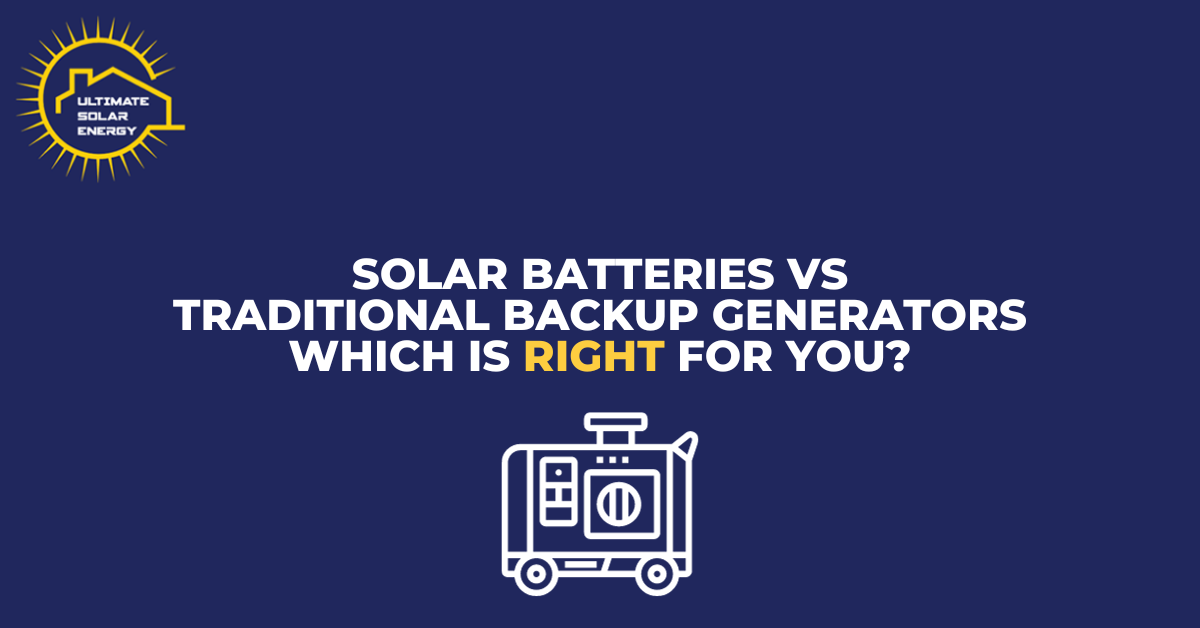Solar Batteries vs. Traditional Backup Generators: Which is Right for You?
In today’s evolving power landscape, having a dependable backup power source is becoming increasingly crucial. Whether you’re preparing for power disruptions aiming to reduce your carbon footprint or simply searching for a cost-effective solution the choice between solar batteries and traditional backup generators holds significant weight. To make things easier we have curated the specifics of both options to assist solar consumers in determining which one better aligns with their needs and preferences.
Solar Batteries
Pros
Solar batteries have emerged as a sustainable solution that has gained popularity over the years. Here are some compelling reasons to consider them:
• Consumer Friendly
Solar batteries store energy generated by solar panels during the day allowing solar consumers to power their place with clean and renewable energy even when sunlight isn’t available. This reduces reliance on fossil fuels and eventually reduces their carbon footprint.
• Easy to Maintain & Silent
Solar batteries are low maintenance and operate silently without noise. There is no need for fuel or oil changes. They generally have an excellent lifespan.
• Energy Self-Sufficiency
Solar batteries make users less reliant on the grid power, making their home or business more resilient during power outages— advantageous in areas prone to severe weather events.
• Saves Money
With time, solar batteries can help solar users save a good amount on their electricity expenses. Solar batteries enable them to utilize the stored energy during peak hours; when grid electricity costs are at their highest.
Cons
- Solar battery installation requires professional assistance.
- These battery backups need recharging once it gets drained. If AC charging is the only option, electricity supply is limited to the battery’s capacity during a blackout.
Conventional Backup Generators
Pros
Traditional power backup generators have been a trustworthy source for decades. Here are some reasons why conventional users might opt for them:
• Instant Power
Generators provide an instantaneous and constant energy source when the grid power goes down, assuring continuous energy to make your home or business fully operational without interruption.
• Greater Power Output
Traditional backup generators offer higher power output capacities than solar batteries, making them appropriate for high energy demand facilities.
• Fuel Versatility
Generators can be powered by various fuels, including natural gas, gasoline, diesel, or propane, giving the consumer more flexibility based on their fuel preferences and availability.
• Lower Initial Cost
In some cases, standard backup generators may have comparatively lower upfront costs than solar battery systems.
Cons
- Traditional power backups are noisy.
- They need fossil fuels and have a high carbon footprint.
- These backups need substantial outdoor space.
- Traditional generators require frequent maintenance.
Solar Battery Backup vs. Conventional Generator: A Comparative Analysis
Selecting the perfect home backup power solution is not a one-size-fits-all choice. It depends on the user’s unique requirements and budget. To assist new solar users in making an informed decision, we have compared these two options side by side.
Price
In terms of upfront costs, a backup battery system is generally pricier than a fossil fuel generator. For residential users’ solar battery systems with sufficient capacity can range from $1,000 to $2,000, per kWh capacity while a generator typically falls between $7,000 and $15,000. The cost for both options varies based on the size; larger capabilities will involve higher expenses.
Installation
In most cases, it is advisable to hire professional installers. The installation process for a fossil fuel generator requires more effort and consideration. Users might need to allocate outdoor space for it, to ensure its protection from environmental factors. Also, there may be a need to connect it to a fuel line if you use natural gas.
Solar battery system installation has two options. First, users can integrate it into their home’s existing wiring. Or, simply plug electronic appliances directly into the battery system. One of the great advantages of these systems is that they are designed to be used indoors, as they are quiet and do not produce any toxic emissions. Solar battery installation is pocket-friendly and easy as compared to traditional generators.
Maintenance and Lifespan
Solar batteries require less maintenance than conventional generators. However, a generator might last from 20 to 30 years with intermittent use and regular maintenance. And solar batteries last between 5 to 15 years.
The Bottom Line
If users want emergency power backup only and do not have any plans to install solar panels and have an existing natural gas line, traditional generators are the perfect choice. However, solar batteries are the best option for users considering installing solar PV systems, aiming to save money on conventional energy bills, want eco-friendly and clean energy solutions, and leverage solar incentives, tax credits, and rebates.
At Ultimate Solar Energy, we make your decision-making process so simple. We design customized solutions based on your requirements, using only the most premium products.
Get a Free Quote now!

